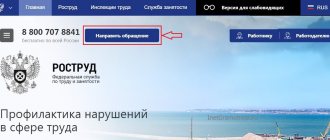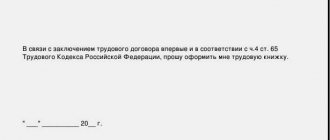About the labor inspection of the city of Moscow
If a citizen has a question for the labor inspectorate, you can use the hotline. Calls are accepted via toll-free number 8 . There is also a separate Moscow number that allows you to contact the local branch. To do this, you need to call 8 495 343 9190 or 8 . The inspection hours are from 9:30 to 18:00. However, the institution has a large number of internal tasks. Therefore, reception of citizens is carried out at certain hours.
Go to the official website git77.rostrud.ru
You can visit the inspection according to the following schedule:
- from 10:00 to 13:00, if a person in need of rights protection wants to visit the organization on Monday, Wednesday or Friday;
- from 14:00 to 17:00 if the visit dates fall on Tuesday or Thursday;
- On Saturday and Sunday the labor inspectorate is not operational.
The organization is located in Moscow at the address: Domodedovskaya street, building 24, building 3. From the metro of the same name to the institution there are buses 148, 274, 694 and 766. You can also get there by minibus. 564 (m) and 635 (m) follow there.
The specifics of contacting the inspectorate depend on the issues for which the person applied to the institution.
So, if a citizen needs help with labor disputes, reception is carried out on a first-come, first-served basis. In this case, you need to visit the office, which is located at the address: Verkhnie Polya Street, building 11, building 1, building 1. The labor inspection is located on the left side of the shopping center. In front of the entrance there is a sign “Basic labor protection center of the Southern Military District of Moscow.” From the Bratislavskaya metro station there are also route taxis 517 (m), 520 (m) and 526 (m) to the institution. You need to travel 5 stops to Krasnodonskaya Street. Then you have to walk 500 m.
Video
Application to the labor inspectorate - sample
State Labor Inspectorate
Moscow, st. Vatutina, 15
from Voloshchuk Andrey Igorevich
Moscow, st. Zhukova, 22, apt. 16
contact phone: 25-14-17
COMPLAINT
From 2009 to today, I, Voloshchuk Andrey Igorevich, have been working as a builder at Bystro Dom LLC, which is located at Moscow, Metallurgov Street, building 17. From May 2012 to the present, they have refused to provide me with annual paid leave, arguing that lack of a replacement person. I wrote a leave application several times, but the HR employee refused to accept it.
When I received another refusal on July 12, 2015, I filed a complaint with the general director of the company, Nikolai Grigorievich Gusakovsky. The assistant at the director's reception accepted the application, but did not agree to record this fact on my copy. I never received a response to the appeal.
I decided to talk to the director of the enterprise personally and made an appointment on August 14, 2015. During the conversation, Gusakovsky N.G. directly indicated that I would not be given leave, and if I wanted to argue, I could quit.
In connection with the above
ASK:
take control of this fact and punish those responsible;
exercise my right to paid leave.
August 19, 2015 Voloshchuk A.I.
Powers of the Inspectorate
The rights that the institution has are enshrined in Article 356 of the Labor Code of the Russian Federation.
The Labor Safety Commission has the right:
- apply to court or other authorized bodies if a violation is discovered;
- monitor compliance by the employer and employee with the norms of current legislation;
- monitor compliance with regulations regarding the restoration of infringed rights;
- suspend the activities of legal entities, their divisions and branches;
- apply administrative penalties to any party to the labor relationship;
- provide acts on the basis of which a person can be removed due to the fact that he was not familiar with safety precautions, or the process was performed improperly;
- verify the employer's involvement in the accident;
- investigate incidents that occur at work.
System of bodies protecting labor rights
Current legislation offers a fairly wide range of ways to protect rights and legitimate interests violated during the use of hired labor. Their classification is based on the subject empowered to carry out protection. So, in accordance with Art. 325 of the Labor Code, state supervision and control over compliance with labor legislation is carried out by the relevant state bodies. The function of public protection of workers' labor rights is performed by trade unions in the forms determined by the Labor Code. Workers implement self-defense independently, that is, without the participation of any jurisdictional bodies (for this reason, this aspect is not discussed in this section).
According to a number of experts, attention should be paid to the fact that the protection of labor rights and the consideration of labor disputes in accordance with the Labor Code are not the same thing. Within the meaning of Art. 352 it does not list all, but only the main ways to protect labor rights and legitimate interests of workers. In this regard, it seems not entirely logical that in the above list there is no such form of protection of the rights and legitimate interests of subjects of labor relations as the resolution of labor disputes. At the same time, the procedure for resolving collective labor disputes, as well as the process of considering and resolving individual labor disputes, in our opinion, is also a form of protection.
The variety of protection methods raises the problem of choosing a protecting authority. To make the right choice, in our opinion, it is necessary to know the general organization and powers of these bodies.
State supervision and control over compliance with labor legislation is enshrined in the Labor Code (Chapter 57) as one of the ways to protect labor rights and legitimate interests of workers. Thus, supervisory and control activities are understood as the implementation of actions to control and supervise the execution by state authorities, local self-government bodies, their officials, legal entities and citizens of the generally binding rules of conduct established by the Constitution, federal constitutional laws, federal laws and other normative legal acts.
Article 353 of the Labor Code establishes a system of supervisory and control bodies, assigning federal supervision, federal executive authorities, executive authorities of constituent entities of the Russian Federation, local government bodies and prosecutorial authorities as its constituent elements.
State supervision and control bodies for the safe conduct of work in certain industries and at some industrial facilities are provided for in Part 2 of Art. 353 of the Labor Code, among them, along with the federal labor inspection bodies, there are federal executive authorities for supervision in the established field of activity (Articles 366 - 369 of the Labor Code).
These bodies deal with a special range of issues related to labor protection, health and safety of workers in the relevant sector of the national economy. They can be roughly divided into two categories. The first consists of federal supervisions, which occupy an independent position in the structure of executive authorities: Federal Mining and Industrial Supervision of Russia (Gosgortekhnadzor of Russia); Federal Supervision of Russia for Nuclear and Radiation Safety (Gosatomnadzor of Russia). The second includes supervisory and control bodies that are part of the system of ministries as structural units: bodies within the Ministry of Industry and Energy of the Russian Federation, which deal with issues of energy supervision, and the Ministry of Health and Social Development of the Russian Federation, which is in charge of issues of sanitary and epidemiological supervision in the country.
To carry out their tasks and carry out their functions, state supervisors are vested with a certain range of powers, including those of authority. For example, Gosatomnadzor of Russia has the right to: issue mandatory orders to managers and officials of organizations to eliminate identified violations of the terms of permits (licenses), requirements of federal standards and regulations in the field of atomic energy use; issue orders to the same persons to suspend work carried out in violation of the terms of permits (licenses), requirements of federal standards and regulations in the field of atomic energy use; prohibit the use of equipment and technologies that do not meet the requirements in the field of nuclear and radiation safety.
Officials of all state supervision bodies of the Russian Federation are given the right to impose a fine on heads of organizations (their deputies) for administrative offenses in the relevant area of national economic activity in the manner and amount established by the Administrative Code. The legal status of supervisory and control bodies is established by the Government of the Russian Federation.
Intradepartmental state control over compliance with labor legislation and other regulatory legal acts containing labor law norms in subordinate organizations in accordance with Part 3 of Art. 353 of the Labor Code is implemented by federal executive authorities, executive authorities of constituent entities of the Russian Federation and local government bodies. These, in particular, include the Government of the Russian Federation, which controls the work of federal ministries and other federal executive bodies, and on issues within the jurisdiction and powers of the Russian Federation on subjects of joint jurisdiction of the Federation and the subjects of the Federation, exercises control over the activities of executive bodies of the subjects of the Federation . Federal ministers control the activities of federal executive bodies under the jurisdiction of federal ministries.
Local government bodies exercise internal control in accordance with the legislation of the Russian Federation. So, in accordance with Art. 20 Federal Law “On the General Principles of Organization of Local Self-Government in the Russian Federation” (hereinafter referred to as Federal Law No. 131), local government bodies can exercise certain state powers (including state control in organizations subordinate to local government bodies), if federal executive authorities and bodies The executive authorities of the constituent entities of the Russian Federation, in cases established by federal laws and laws of the constituent entities of the Russian Federation, within the limits of their competence, will issue normative legal acts that are mandatory for execution by local government bodies.
The exercise by local self-government bodies of certain state powers does not change their legal nature, i.e. does not turn them into state supervisory and control bodies, therefore they should be excluded from the text of Art. 353 TK. Taking into account at the same time that local government bodies, in established cases, can exercise powers of state control over compliance with labor legislation in organizations under their jurisdiction, it would be desirable to supplement Chapter 57 with an article corresponding in content to Art. 20 Federal Law No. 131.
Among the state supervisory authorities, in addition to those indicated, the Labor Code identifies prosecutorial authorities. The Prosecutor General and the prosecutors subordinate to him exercise state supervision over the accurate and uniform implementation of labor legislation and other regulatory legal acts containing labor law norms.
Public control over compliance with labor legislation is provided for in Chapter 58 of the Labor Code. Articles 370 - 378 of the Labor Code establish the rights and powers of trade unions to monitor compliance with labor legislation and other regulatory legal acts on labor. To a certain extent, the rights of trade unions are specified by the Federal Law “On Trade Unions, Their Rights and Guarantees of Operations”. According to Art. 19 of the said law, trade unions and labor inspectorates under their jurisdiction exercise public (trade union) control over compliance by employers and officials with labor legislation on issues of employment contracts, working time and rest time, remuneration, guarantees and compensation, benefits and benefits, as well as on other social and labor issues in organizations where members of this trade union work.
Public control over the state of labor protection in organizations is carried out by authorized (trusted) representatives of trade unions. The rights of trade union labor inspectors and authorized (trusted) persons are enshrined in Art. 370 TK. The protective function of trade unions is not limited to conducting inspections of compliance with labor laws. According to Art. 371 of the Labor Code, the employer makes decisions taking into account the opinion of the relevant trade union body in cases provided for by law. For example, part 5 of Art. 73 gives the employer the right, taking into account the opinion of the elected trade union body, in order to preserve jobs during the mass dismissal of workers, to introduce a part-time regime for up to 6 months. Article 99 of the Labor Code allows for overtime work on the initiative of the employer with the written consent of the employee and, in some cases, taking into account the opinion of the representative body of employees. In addition to the established Labor Codes, collective agreements and local regulations of organizations may include other cases when, when making decisions, the employer is obliged to take into account the opinion of the trade union body, as provided for in Art. 372 TK.
The protective function of trade unions is also implemented in the form of the mandatory participation of their elected body in the consideration of issues related to the termination of an employment contract at the initiative of the employer (Article 373 of the Labor Code). For example, his participation is mandatory when resolving issues: about a possible reduction in the number or staff of employees (Part 1 of Article 82 of the Labor Code); on the dismissal of workers who are members of a trade union due to a reduction in the number or staff of the organization, due to insufficient qualifications or due to repeated failure by such workers to fulfill their labor duties without good reason (Part 2 of Article 82 of the Labor Code).
These bodies, although they have broad capabilities, are not bodies authorized to resolve labor disputes. In case of conflict of rights, trade unions and labor inspectorates perform auxiliary functions. For example, in the case of a trade union body, employee or other person contacting the state labor inspectorate on an issue that is being considered by the relevant body for the consideration of labor disputes (except for the courts), the state labor inspector upon identifying a violation of labor legislation or other regulatory legal act containing labor law norms , has the right to issue an order to the employer that is subject to mandatory execution (Article 357 of the Labor Code).
Summarizing, we can conclude that the protection of rights with the help of trade unions and supervisory authorities occupies an intermediate position between direct negotiations with the employer and a labor dispute. Bodies authorized to resolve labor disputes according to their jurisdiction can be divided into two groups: resolving collective disputes; resolving individual disputes.
Individual labor disputes are considered by the CCC and the courts. The Labor Dispute Commission is a body for the consideration of individual disputes arising in organizations, with the exception of disputes provided for in Art. 391 TK. Courts consider (in a general manner) individual labor disputes at the request of an employee, employer or trade union defending the interests of the employee, including when they do not agree with the decision of the CCC or when the employee goes to court without going to the CCC, as well as at the request of the prosecutor, if the decision does not comply with laws or other regulatory legal acts. Consideration of a collective dispute begins with the work of a conciliation commission, which includes representatives of employees and the employer on an equal basis.
The help of a mediator is resorted to in a situation where the procedure for considering a collective labor dispute in a conciliation commission has not led to a resolution of the issue on the merits, but the parties are interested in continuing conciliation procedures. The main function of the mediator is to assist the parties in finding a mutually acceptable solution to resolve a collective labor dispute on the basis of constructive dialogue. Labor arbitration is a temporary body for the consideration of a collective labor dispute, which is created if the parties to this dispute have entered into a written agreement on the mandatory implementation of its decisions.
Separately, it is necessary to say about the service for resolving collective labor disputes. This service does not independently resolve collective labor disputes. Its functions include assistance in resolving collective labor disputes by organizing conciliation procedures and participating in them.
Thus, the bodies for resolving labor disputes are clearly defined by the Labor Code, and labor disputes themselves have specific jurisdiction. The courts have jurisdiction over all individual labor disputes. As for the consideration of collective labor disputes in court, it is important to emphasize that these disputes are resolved according to the Labor Code only through conciliation procedures, and the court only considers cases on declaring strikes illegal.
Taking into account the above, we can conclude that the bodies authorized by the state to protect the rights of employees are conditionally divided into two large groups. The first includes all bodies exercising control and supervision, the second includes bodies resolving labor disputes. Thus, supervisory and control bodies ensure compliance with labor legislation, and their activities are of a preventive or control nature. Their powers include consideration of issues in which there is a clear and indisputable violation of the law and only the restoration of the violated right is required. Questions about conflicts of rights, due to a certain limitation of the powers of supervisory authorities, cannot be resolved by them and are considered by the courts.
Reasons for filing a complaint
The Labor Inspectorate allows a citizen to defend his rights. Any employed person who has discovered a violation can contact the organization. The rule applies even if it was committed against another citizen.
The State State Transport Inspectorate has the right to carry out the following procedures:
- register the received request;
- become familiar with the specifics of the current situation;
- order the violator to eliminate the identified deficiencies;
- bring to justice.
It is recommended to find the address of the labor inspectorate in Moscow and visit the organization if the employment contract is illegally terminated or there is a delay in the payment of wages, sick leave, vacation pay or other compensation.
Video
Often institutions refuse to provide funds for overtime. It will also be possible to prove your case to the labor inspectorate if the organization does not provide sick leave or vacation. Appeal is also permissible if other rights of the employee are violated.
A citizen who was not hired by an organization and considers the refusal illegal can submit an application. You can get a consultation in advance. The hotline or the official website of the labor inspection - git77.rostrud.ru will help with this.
What does the labor inspectorate check in response to a complaint?
IT has the right to request documentation that regulates the relationship between the employee and the employer.
The enterprise must maintain such local regulatory documents as staffing, internal labor regulations, vacation schedules, regulations on the protection of personal data of employees (and the obligation of non-disclosure), and regulations on remuneration. They will be reviewed by the inspector. They will also check the facts that the employee is performing job duties, having previously signed an employment contract, and orders regarding personnel record all personnel movements.
The first and most important point of emphasis for the inspector will be the fact of the existence of employment contracts and compliance with the rules for maintaining and storing work experience books approved by law. They will also check the time sheet to look for discrepancies in it and payments to the employee. For example, for night shifts or overtime work. The IT inspector will not miss information about the work of certain categories of citizens (disabled people, minors, pregnant women) who are subject to the rule on limiting working hours.
The process of drawing up an appeal
If a person is forced to file a complaint with the Russian state inspectorate for the first time, it is problematic to carry out the procedure independently. It is recommended to use a ready-made sample.
If a person nevertheless decides to submit an application to the committee on his own, it is important to include in it all the necessary information, the list of which includes:
- information about the applicant applying to the Moscow Labor Inspectorate;
- information about the employer violating workers' rights;
- information about the legal entity;
- place of the offense, time of incident;
- the requirements put forward;
- date of the application
It is necessary to clearly state the current situation. It is also important to provide only reliable information to Rostrud. Do not use jargon, threats or insults. Typos or corrections in the text are not allowed. It is important to supplement the application with evidence of your case, if any.
Professional assistance in resolving labor disputes - review of the TOP 3 law firms
Resolving a labor dispute on your own is not always comfortable, since most of us experience stress in such situations. This does not promote sound judgment and good decision making.
So I recommend hiring a lawyer to apply for a power of attorney, a sample of which is available from any notary.
Here are three reliable companies that provide such services.
1) Lawyer
Contact this company whenever you need qualified legal advice with guidance for action. Thousands of lawyers from all over Russia work on the portal, and hundreds of workers are online at the same time. The Lawyer's website is a platform for interaction between specialists and citizens and organizations.
To get advice, just go to the portal and formulate your question or problem in the feedback form. Write clearly and concisely. The lawyer must understand what result you want to get. After paying a small amount, you will receive detailed instructions that will help you solve the problem yourself, without the help of other lawyers.
If you do not want to deal with the problem yourself, then you can arrange a meeting with the lawyer who lives closest to you. Since there is very high competition among the specialists of this company, they charge quite a reasonable fee for their services. If you want to submit an application with supporting documents to the labor inspectorate online, please contact ]Pravoved[/anchor].
2) Lexlife
This company specializes in resolving all types of disputes in court and out of court, including the settlement of labor disputes. The main thing is not to miss the deadline established by law for contacting the labor inspectorate, especially after dismissal. To do this, you need to immediately use the services of Lexlife.
Company Services:
| № | Name of service | The essence of the service |
| 1 | Consulting | Providing consulting services in oral and written form on labor legislation |
| 2 | Pre-trial settlement of a dispute with an employer | By contacting the labor inspectorate and negotiating with the company administration |
| 3 | Drawing up a claim, statement of claim | Competent execution of these documents with references to legislation |
| 4 | Protecting employee interests in courts | Full support in court |
3) Yuskon
The main activity of the company is accounting support. However, resolving personnel issues of the enterprise is also within the sphere of interests of the company. If you are an employee, then specialists will advise and protect your rights, both in the labor inspectorate and in court. If you are an employer, then by concluding an agreement with them, you will protect yourself from unnecessary claims related to violation of labor laws.
Now I suggest you watch a thematic video.
Download complaint samples
- Complaint to the Labor Inspectorate (standard form)
- Complaint to the Labor Inspectorate about violation of labor rights
- Collective complaint to the Labor Inspectorate
- Complaint about non-payment of wages to the Labor Inspectorate
- Complaint about non-payment of compensation upon dismissal to the Labor Inspectorate
- Complaint to the Labor Inspectorate about non-payment of bonuses
- Complaint against an employer about black wages to the Labor Inspectorate
- Complaint about non-payment of maternity benefits to the Labor Inspectorate
- Complaint to the Labor Inspectorate about forced dismissal
- Complaint to the Labor Inspectorate about illegal dismissal
Video
Labor inspector and his rights
The activities of inspectors are carried out on the basis of Articles 356 and 357 of the Labor Code of the Russian Federation
. According to the above articles, they have the right:
- If they have an ID, they can
the company they are interested in at any time - Request the employer to provide any documentation affecting the rights and personal interests of employees
; - To remove
for subsequent research examples of materials and substances used at the enterprise.
Methods of application and deadlines for consideration of the application
There are three ways to contact the Moscow labor inspectorate. A personal visit to the organization is considered classic. The inspector will be able to submit the application independently or through a representative.
The document is drawn up in 2 copies. Additionally, identification will be required. If the paper is submitted through a proxy, it is important to issue a power of attorney. One copy remains in the office of the institution. A stamp confirming the fact of acceptance is affixed to the second copy. The document remains with the applicant.
An alternative is to send the application by mail. However, there is a risk that the letter will not reach the addressee. Therefore, it is recommended to send the documentation by registered mail with a list of attachments. You must keep the receipt. It can be used as evidence if deadlines are missed. When the addressee has received the letter, the citizen will be provided with appropriate notification. The moment of acceptance of the application is considered to be the date indicated in it. From this moment the calculation of deadlines begins. Online submission is also acceptable. To do this you need to follow the link. Once the application is accepted, staff will review it within a month. The applicant is then required to provide a response.
Federal Labor Inspectorate (FIT)
FIT
– a common centralized network, including federal executive bodies involved in state supervision of compliance with the labor code and other documentation at the federal level. FIT is also the supervisory authority for state labor inspectorates.
Ordinary employees as well as trade union organizations can apply here
. The main task of the FIT is to protect the rights of workers.
What sanctions can the FIT apply?
- Temporarily stop the activities
of the enterprise or its part; - Issue a fine
of the established amount; - Suspend an employee
from conducting business (temporarily or permanently).
Structure of Rostrud
The head of Rostrud is appointed and dismissed by the Government of the Russian Federation on the proposal of the Minister of Labor and Social Protection of the Russian Federation.
By Order of the Government of the Russian Federation No. 518-r dated 04/05/2013, Vsevolod Lvovich Vukolov , who is an active state adviser of the Russian Federation, 1st class, was appointed Head of the Federal Service for Labor and Employment.
By Decree of the Government of the Russian Federation No. 156 of 04/06/2004, Rostrud is allowed to have up to 9 departments in the main areas of the service’s activities in the structure of the central apparatus.
Filing a complaint to Rostrud electronically
You can also submit a complaint electronically in two ways:
- Through the service onlineinspektsiya.rf;
- By email.
Complaint through the service onlineinspektsiya.rf
So, first of all, you will need to go to the onlineinspection.rf service and go down to the “Report a problem” section.
This is also important to know:
Probationary period when hiring: its duration, sample employment contract
Click on a section.
Then you need to select the category under which you want to file a complaint. For example, "Salary".
And then a sub-item, for example, “Salaries are being delayed.”
Free legal consultation We will answer your question in 5 minutes!
Ask a Question
You will then need to select the outcome you would like to achieve with your complaint:
Free legal consultation
We will answer your question in 5 minutes!
Ask a Question
- Consultation;
- Or check.
After this, you will be asked to log in through the State Services portal.
Important
And after authorization, you will be able to write the text of the complaint itself, as well as attach all the necessary documents.
Complain by email
You can send your letter to the citizen reception department of Rostrud by mail
In the letter, you need to indicate in a general form the problem you are addressing, write your contact details, details of the employing organization (Legal name (Horns and Hooves LLC), Taxpayer Identification Number, Primary State Registration Number, physical and legal addresses) and attach additional documents, which somehow prove that you are right - so that it is easier and faster for the inspector to understand your issue.
And wait for an answer.
How to appeal the decision of the labor inspectorate - procedure
Unfortunately, the decision of the labor inspectorate does not always completely satisfy the victim. But everyone has the right to appeal against it, first with the head of this service, and then in court.
How to do this - read below.
Action 1. Compose and send a letter to the head of the labor inspectorate
If you think that during the inspection the inspector did not take into account some arguments and made a decision not in your favor, prepare a letter addressed to his supervisor. In it, describe in detail the essence of the problem, attach a copy of the inspector's response and indicate the points with which you disagree. Justify your statements. If necessary, find additional arguments in your favor.
The period for consideration of such a complaint is no more than 30 days. If you are satisfied with the results, the incident can be considered over. If not, then move on to the next step.
Action 2. We collect documents and materials that you want to challenge
You need to provide the court with those documents that, in your opinion, are controversial. These include: orders and instructions from the manager, timesheets and schedules, settlement documents. Here we also put the answers received from the labor inspectorate.
Action 3. Go to court
I recommend filing a claim with the courts only after you receive a response from the head of the inspection.
We write a statement of claim according to the sample that we take in court. We attach to it the documents listed above, and declare witnesses if necessary. Don't forget to pay the state fee. When going to court, I recommend hiring a lawyer who has experience handling civil cases in the area of employment law.
Directorates and departments of Rostrud
In accordance with the above-mentioned Decree of the Government of the Russian Federation No. 156, the central apparatus of Rostrud, in addition to advisers and assistants to the head of the service, is formed by :
- Department of supervision and control over compliance with labor legislation;
- Office for Federal State Supervision of Compliance with Labor Laws and Other Legal Acts Containing Labor Law Standards;
- Department of supervision and control in the field of employment;
- Department of Planning, Interaction with Regions and Control;
- Department of legal support for the activities of the central office and legal support of territorial bodies of Rostrud;
- Department of Economics, Finance and Accounting;
- Business management;
- Office of Information Technology;
- Department for the provision of social guarantees and organization of state control of the quality of social assistance to the population;
- Department for organizing events for mobilization preparation and mobilization;
- Department for the Protection of State Secrets.







